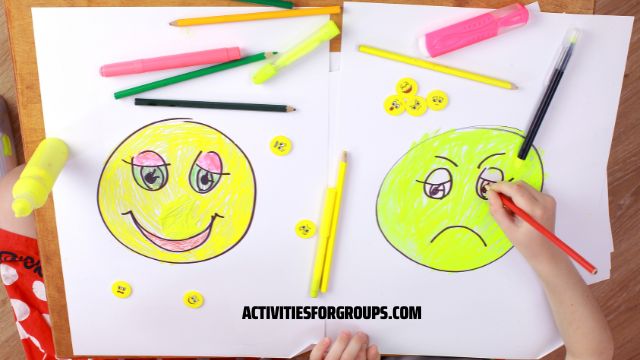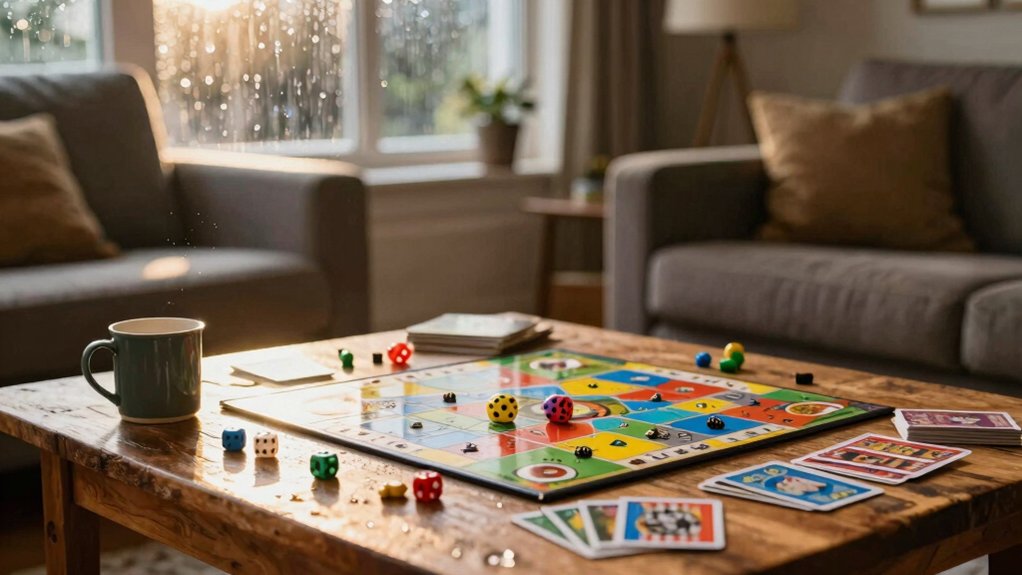Group activities are a great way for people to develop their emotional intelligence. They provide an opportunity for individuals to come together, share experiences, and practice skills that will enable them to gain greater self-awareness and better manage their emotions in a variety of situations.
The power of groups has long been recognized as having the potential to act as catalysts for positive change. People learn from each other’s stories and perspectives, allowing them to feel connected with others who may be experiencing similar struggles or challenges.
This connection often opens up opportunities for personal growth by providing support and new ways of thinking about one’s own life circumstances. Group activities also offer members the chance to practice social interaction skills such as active listening, responding non-defensively, taking turns speaking, and showing empathy toward others’ thoughts and feelings.
By incorporating interactive elements into group activities such as role-playing exercises or problem-solving tasks, participants are able to observe themselves engaging in conversations through which they can identify areas where they need further development in order to increase their emotional intelligence levels.
With these things considered, let us take a closer look at how we can design effective group activities geared toward helping individuals find success in fostering emotional intelligence growth!
Read More: Fun Beach Activities Ideas For Team Building: Ultimate Guide.
10 Fun Group Activities Ideas For Emotional Intelligence Development

| Activity | Preparation | Contribution |
|---|---|---|
| Mindful Meditation | Provide a quiet space and guided meditation resources. | Improved self-awareness and self-regulation. |
| Role-Playing Exercises | Prepare scenarios and provide guidance for participants. | Improved empathy and social awareness. |
| Emotional Check-Ins | Create a safe space for participants to share their emotions and experiences. | Improved communication and relationship building. |
| Journaling Prompts | Provide writing prompts and resources for reflection. | Improved self-awareness and self-reflection. |
| Emotional Regulation Strategies | Provide resources and guidance for practicing emotional regulation techniques. | Improved self-regulation and impulse control. |
| Team-Building Exercises | Plan activities that require cooperation and communication among team members. | Improved social awareness and relationship building. |
| Gratitude Exercises | Provide resources and guidance for practicing gratitude exercises. | Improved emotional awareness and appreciation. |
| Conflict Resolution Exercises | Provide scenarios and guidance for practicing conflict resolution techniques. | Improved communication and relationship building. |
| Nonverbal Communication Exercises | Plan activities that focus on nonverbal communication and interpretation. | Improved social awareness and empathy. |
| Creative Expression Workshops or Activities | Provide resources and guidance for creative expression through art, writing, or music. | Improved self-awareness and emotional expression. |
These group activities can be effective in developing emotional intelligence by enhancing various skills such as self-awareness, self-regulation, empathy, social awareness, communication, and relationship building. Proper preparation and planning are necessary to ensure that the activities are effective and contribute to the development of emotional intelligence. The contribution of each activity may vary depending on the needs and preferences of the participants.
Benefits Of Developing Emotional Intelligence

Developing emotional intelligence can bring about a wide range of benefits. It helps individuals better understand and manage their emotions, as well as those of others. In turn, this can improve an individual’s social skills, personal growth, mental health, and overall well-being.
The first benefit of developing emotional intelligence is increased self-awareness. Individuals learn to recognize triggers that lead to strong emotions and become more mindful in managing these feelings. This allows them to have greater control over how they respond to certain situations rather than letting their emotions take the reins.
Another key benefit is improved communication skills; understanding one’s own feelings increases the ability to empathize with other people’s perspectives which leads to smoother conversations and stronger relationships. Additionally, honing emotional intelligence encourages positive thinking habits which are beneficial for problem-solving decisions and navigating difficult circumstances in life.
In addition to improving interpersonal interactions, cultivating emotional intelligence also promotes personal growth through enhanced introspection. People who set aside time for reflection tend to gain valuable insights into themselves by becoming aware of core values and strengths that could be further developed or utilized in everyday life.
Developing such awareness positively impacts mental health by reducing stress levels associated with feeling overwhelmed or out of control in various scenarios; instead, it enables individuals to focus on what they can do rather than worrying excessively over matters outside their power or influence.
By leveraging techniques like deep breathing exercises, journaling, meditation practices, mantras, and affirmations, individuals get a chance to explore thoughts and practice mindfulness at a deeper level – thereby allowing access into unknown parts of oneself that may need attention or healing from past traumas or wounds.
This creates space for potential transformation within – enabling true connection with the innermost being empowering each person uniquely on their journey towards self-actualization.
Types Of Group Activities

Group activities are an effective way to develop emotional intelligence in a team setting. They promote collaboration and problem-solving, while also fostering empathy among members of the group.
By incorporating these types of exercises into a training program, participants can learn how to better manage their emotions and be more aware of those around them.
Here are 5 popular group activities for developing emotional intelligence:
- Team Building Exercises – These types of activities help build trust between members by encouraging communication and cooperation. Examples include icebreakers, scavenger hunts, blindfolded relay races, or brain teasers.
- Problem-Solving Activities – Participants must actively work together to solve puzzles or challenges in order to achieve success. Examples might include constructing a human pyramid or building something out of recyclable materials.
- Puzzle-Solving Tasks – Puzzles require critical thinking skills and creativity to complete; they challenge teams both mentally and emotionally as they search for solutions together. Possible options include card games, jigsaw puzzles, mazes, crosswords, etc.
- Journaling Exercises – Writing is an excellent tool for self-reflection and exploring personal feelings on certain topics. Group discussions can then be held afterward to share experiences with one another.
- Empathy-Building Games – These activities allow people to understand what it’s like from the perspective of someone else through role-playing scenarios such as interviewing each other about job positions or pretending you’re two different characters having a conversation with each other.
In addition to helping individuals become more emotionally intelligent within the team setting, engaging in these activities also helps create stronger bonds between all members which will ultimately benefit any organization as a whole when working towards achieving common goals. Moving forward onto discussing role play exercises…
Role Play Exercises
Tapping into the power of group activities to nurture emotional intelligence can be likened to a beautiful symphony. Role-play exercises are one such activity that encourages team members to explore their emotions more deeply and in turn, improve communication with others.
Role-play exercises help build both self-awareness and interpersonal skills by creating situations where participants must consider how they interact with each other. Emotional Intelligence role-plays often ask participants to assess feelings, reactions, and perspectives from different angles. Group role-play is an excellent way for teams to become more conscious of what it takes to foster healthy relationships within the workplace.
Self-reflection role-plays give individuals the opportunity to evaluate their own behavior while also understanding the impact of their words or actions on those around them. Interaction role-plays allow groups to practice empathy and compassion toward each other’s thoughts, opinions, and beliefs without judgment.
These types of activities call upon teams to actively have respect for each other’s strengths as well as weaknesses so that everyone feels heard and validated. By engaging in these conversations together, teams can learn how better understand themselves as well as others – all instrumental pieces towards developing emotionally intelligent work environments.
The journey towards emotional intelligence does not end here though; next up we’ll explore further ways for teams to grow through communication games!
Communication Games
Group activities for emotional intelligence development can involve communication games. These types of games are designed to improve understanding between team members and help build trust among them. Team-building exercises such as these can be used in many different ways, from helping new employees get acquainted with each other to strengthening relationships between seasoned colleagues.
Communication games typically require participants to think critically about the situation they’re presented with and then work together on problem-solving strategies to reach a solution. They provide an opportunity for teams to practice active listening skills, learn how to collaborate effectively, and develop strategies that will ultimately benefit their group dynamic.
These activities also offer a unique chance for individuals to look beyond their own perspectives and explore the experiences of others in order to come up with creative solutions. Through effective communication and engaging gameplay, everyone has the potential to gain insight into one another’s emotions – an essential part of developing healthy relationships within any organization.
With this knowledge, it is possible for teams to move onto more complex stress management activities that challenge their collective ability to identify areas of improvement while continuing to foster stronger interpersonal bonds among its members.
Stress Management Activities

Having just discussed the fun and interactive ways to develop communication skills, it is now time to dive into something even more important – Stress Management Activities. These activities are of utmost importance when it comes to emotional intelligence development as they help individuals become better at regulating their emotions and managing conflicts in an effective way.
The key word here is self-regulation! When someone can learn how to regulate themselves emotionally, then they will be able to manage difficult situations with greater ease and less stress. This is why developing these kinds of skills through simple exercises is highly beneficial for boosting one’s overall emotional intelligence.
To begin with, try out some relaxation techniques such as deep breathing or guided imagery which can assist you in calming down during moments of high tension and anxiety. Additionally, there are a plethora of other excellent methods for reducing stress, like yoga, walking outdoors, listening to music, or doing journaling exercises that allow you to express your feelings without judgment.
All these activities have been proven very useful for building a stronger sense of self-control over personal emotions while resolving any kind of misunderstanding or disagreement with others.
It’s clear that taking the necessary steps towards becoming more aware of our own behavior and reactions can lead us closer to achieving greater mental well-being; this understanding should naturally propel us further into exploring Self-Awareness Building Exercises in the next section…
Self-Awareness Building Exercises
Self-awareness is the foundation for emotional intelligence development, and group activities can be an effective way to help individuals increase their self-awareness. Emotional awareness requires introspection and reflection, but it can be difficult for people to do this on their own. Group activities provide a safe space where members of the group can engage in self-discovery activities together.
One popular activity that helps build self-awareness is creating personal timelines. Each person in the group creates a timeline with significant events from their lives, reflecting on how these experiences have shaped who they are today. This exercise encourages participants to think deeply about themselves and share what they discover with others in the group. Working together on something like this can lead to meaningful conversations as well as a greater understanding of each other’s perspectives.
Another great activity for developing self-awareness is role-playing or improvisation games. These games involve imagining different scenarios which challenge participants to explore aspects of themselves that may remain hidden under everyday circumstances.
By looking at situations through another lens, individuals learn more about how they react emotionally without judgment from those around them. With practice, this type of activity can help cultivate deeper levels of self-reflection within the individual and promote growth in emotional intelligence.
By engaging in these types of activities, individuals gain valuable insight into their strengths and weaknesses related to their level of self-awareness so that they can better assess progress toward furthering their emotional intelligence development goals.
Assessing Progress
Having gone through the self-awareness-building exercises, it’s time to assess progress. It is necessary for group development and emotional intelligence improvement that each individual in a group be aware of their own skills and how they are progressing with them over the course of the session. Assessing progress helps individuals identify any areas where further improvement may be needed in order to achieve desired results.
It is important for groups to engage in activities designed to improve emotional intelligence to make sure that everyone involved has an opportunity to assess their individual progress as well as the overall progress of the group within which they belong. Individuals should have access to feedback on their performance from other members of the group so that they can better understand their strengths and weaknesses when it comes to emotional intelligence-improving activities.
This will help ensure that everyone remains motivated and engaged during sessions, while also helping them learn more about themselves and develop new skills.
The assessment process should include both qualitative and quantitative measures that provide insight into individual levels of skill acquisition, understanding of concepts related to emotional intelligence, attitude towards learning new techniques, ability to apply these techniques in practice, and improvements made since beginning the program or activity.
Regular assessments throughout the duration of a program can significantly boost its effectiveness by providing participants with tangible evidence of growth or lack thereof. Evaluating successes achieved thus far allows individuals to feel proud of what they’ve accomplished while simultaneously recognizing areas requiring greater attention for future success.
Frequently Asked Questions [FAQs]
In this section of the article, we are going to answer some of the most commonly asked questions regarding Group Activities Ideas For Emotional Intelligence Development.
What Qualifications Are Needed To Lead Emotional Intelligence Development Group Activities?

When it comes to leading emotional intelligence development group activities, the qualifications needed for an effective facilitator are essential. An emotional intelligence trainer should have experience in developing and training individuals on how to use their emotions positively as well as managing interpersonal relationships.
Additionally, they must possess a strong understanding of various approaches utilized in developing emotional competencies such as self-awareness, empathy, and assertiveness.
An emotional intelligence coach requires advanced knowledge in the field of psychology, ideally with a specific focus on adult learning theory and practice. They need to understand what motivates people and be able to provide guidance through challenging situations.
It is also important that they have a clear understanding of their role within the context of each individual’s unique situation.
An effective emotional intelligence facilitator needs excellent communication skills so that they can successfully guide conversations amongst members of a group while ensuring everyone feels comfortable participating fully.
Furthermore, they must have prior experience running an emotional intelligence program or curriculum which includes providing feedback to participants according to their level of progress and helping them set achievable goals with measurable outcomes.
To summarise:
- A qualified emotional intelligence trainer needs to know how to develop an individual’s emotions and manage interpersonal relationships;
- An experienced emotional intelligence coach should comprehend adult learning principles;
- An emotionally intelligent facilitator should possess strong communication expertise;
- Facilitators need proficiency in implementing an appropriate emotional intelligence program or curriculum with tangible objectives.
The importance of having the right professional qualifications when facilitating any form of group activity cannot be overstated – especially when it comes to enhancing one’s own ability for managing emotions effectively. Having someone who is knowledgeable and experienced in this area can make all the difference between achieving desired results from group activities or not.
What Is The Best Size For An Emotional Intelligence Development Group?
Finding the perfect group size for emotional intelligence development can be a daunting task! Ideally, creating an atmosphere where each individual’s needs are met and their growth is nurtured requires skillful management of not only group activities, but also of the group’s size.
After all, it could be argued that having too many people in one space might make it difficult to get everyone involved and truly benefit from the development activities.
On the other hand, having too few participants may lead to inadequate discussion or a lack of diversity in thought processes. So what is the best size for an emotional intelligence development group?
When considering a suitable number of individuals within a specific context, there are several factors to consider. First and foremost, depending on the type of activity being conducted, certain numbers may be required in order to ensure success. For example:
- If you plan on running icebreaker exercises such as role plays or team problem-solving tasks then the ideal number usually lies between 6-10 people
- If conducting more interactive activities like debates or simulations then 8-12 members would provide enough perspectives while still allowing everyone to participate fully
- To create an environment conducive to meaningful conversations about personal experiences with emotional intelligence then 4–6 people should suffice
It is important to note that these general guidelines do not guarantee successful outcomes in every instance; rather they serve merely as starting points for finding out which works best for your particular situation.
As any experienced practitioner will tell you – when dealing with matters related to emotional intelligence – no two groups are alike! Taking into account dynamics such as age range and cultural backgrounds etc. gives us greater insight into how different sizes can shape our expectations of results from various development activities.
Ultimately though, striking the right balance between quantity and quality must take precedence over everything else if we want our efforts spent on developing emotional intelligence skills among members of a given group setting to bear fruit effectively.
What Is The Optimal Length Of Time For An Emotional Intelligence Development Group Session?

When discussing the optimal length of time for an emotional intelligence development group session, it is important to consider the overall goals and objectives of the group. This can vary depending on the nature of the activity and the desired outcome.
Generally speaking, a group session should be long enough to allow participants to explore their emotions in depth while still providing enough structure so that activities remain focused and productive.
The duration of a group session will depend upon several factors such as the size of the group, it’s level of expertise in developing emotional intelligence, and any specific topics or activities being covered during the session.
For example, if a topic like anger management is being discussed then more time may need to be allotted than if simply introducing new concepts into the conversation was all that was required. It is also important to note that groups with different levels of experience may require different lengths of sessions in order to ensure everyone’s needs are met.
Optimizing your group’s session time for emotional intelligence development requires careful planning and consideration of these various factors before beginning any work together.
A good starting point would be to determine how much time each participant has available for discussion and practice exercises before setting a timeline for completing those tasks within each meeting.
Once you have established this baseline, adjust accordingly depending on what topics arise during each session. Asking questions throughout also helps gauge progress toward achieving desired outcomes and ensures no one gets left behind when exploring complex subjects related to emotional intelligence development.
Ultimately, determining an optimal length for your group session will come down to trial and error as well as understanding individual learning styles and preferences among members; however, by taking into account key considerations such as size, skill level, and agenda items beforehand you’ll be able set realistic expectations which lead to successful results over time.
Conclusion
In conclusion, group activities for emotional intelligence development can be a very effective way of helping individuals develop their self-awareness and interpersonal skills.
When carried out by an experienced facilitator with the right qualifications, such activities can help us understand our own emotions better as well as how to interact more effectively with others.
The best size for these groups should typically range from 5-10 people so that each individual has enough opportunity to participate in discussions or activities.
The optimal length of time for one session is usually 1-2 hours; however, this will depend on the specific activity being conducted and the goals of the group.




Leave a Reply